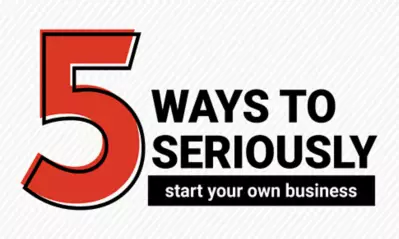Articles > Entrepreneurship > How to fund a business start-up
How to fund a business start-up
April 1, 2025

Written by Michael Feder

Between writing a business plan and launching a new venture, most entrepreneurs need to plan how to get funding to start a business. To write a solid business plan, you have to be acutely aware of how much funding your business will need. Consider all avenues of business finances. It’s tempting just to think about the cost of goods and sales price, but it tends to be a bit more complicated than that — especially when you’re getting started.Â
The first step in how to fund a business start-up
To write a solid business plan, you have to be acutely aware of how much funding your business will need. Consider all avenues of business finances. It’s tempting just to think about the cost of goods and sales price, but it tends to be a bit more complicated than that — especially when you’re getting started.Â
Before you approach how to fund a business start-up, you need to know what you’ll need money for. Calculating your startup costs will take some attention to detail, but it’s crucial to project as close as you can to the actual funding amount. This way, you’ll be able to have a zero-balance balance sheet to show prospective investors, banks, and other funding sources exactly where their money is going. Besides, having a financial plan outline can help prevent getting in over your head.
Depending on your type of business, you may be eligible for certain tax deductions. Calculating your startup costs highlights those areas and projects how much you can claim when filing taxes for your business. Some costs to consider include:Â
- Utilities
- Office space rental
- Home office rental
- Packaging and shipping
- Employee payroll and insurance
- Licensure fees
- Equipment and supplies
- Actual goods
- Marketing materials
- Ad space
- Website and domain feesÂ
This isn’t all-inclusive, and it will look different for every company — especially if you’re solely brick-and-mortar or solely online. Universally, however, you want to estimate as close as possible to the actual amount you’ll spend. This can be tricky, but use historical data from similar companies or similar personal purchases. The goal is to project five years of expenditure.
Funding sources for a new business
As an entrepreneur, you have several ways to raise funds to start a business. You can pursue a combination of the following funding sources.
Self-funding
Sometimes, rather than struggling with how to get funding to start a business, entrepreneurs can fund a business themselves — either partially or wholly. This doesn’t include taking out a business loan. It usually derives from the business entrepreneur’s savings or alternate income.Â
Investors
Investors may include individuals or organizations that provide money toward your business. Usually, this is a transaction in which the investors expect to receive financial gain in the end. For someone to invest in your business, you must convince them — as transparently as possible — that the money they put in will be returned to them, and then some.
 typically include:Â
- Angel investors — Individuals with significant financial resources.
- Bank lenders — Bank-owned loans for established businesses.
- Peer-to-peer investors — Companies that work with small businesses to procure money to fund a business from partnered lenders.
- Personal investors — People in your network of family, friends and acquaintances who have a vested interest in helping fund your business.
- Venture capitalists — Organizations that provide private equity funding to companies that they deem to have high potential.
If you aren’t confident that your business will make money for your investors, you may want to look at alternative options for funding. Venture capitalists, for example, sometimes offer startup camps to help growing businesses secure seed funding. You’ll need to perfect an “elevator pitch” to sell your idea to any of the above investors.Â
Crowdfunding
With the multitude of platforms available, you’ve probably heard of crowdfunding. Formally, it’s the process of procuring funds, typically small amounts, from a large number of people. Fundraisers mostly do this online through various sites.
While this is a popular medium, it can be hard to stick out. The saturation of startups attempting to gain traction through crowdfunding means you’ll have to use a bit of finesse to make this strategy work for your business. At the very least, you’ll want to:Â
- Pick the right platform
- Showcase your business clearly and concisely
- Use aesthetically pleasing media
- Draw in people with a story
- Create levels of gifts with possible incentives
Sometimes, people give out of the goodness of their hearts and because they want you to succeed. Other times, though, they are prompted to give only if there’s an appealing reward in it for them. This can be anything from a fun T-shirt to a free service after your business launches. Crowdfunding works, but only if you get creative and can reach a large number of people willing to donate.
Small business loans and grants to fund a business
We’ve already mentioned banks as a possible source of funding, but other organizations also might provide loans and grants. In fact, a variety of companies exist to fund small business startups. They are typically listed on a register of grant opportunities and may vary depending on your location and field of business.
Loan and grant opportunities will fluctuate but are usually offered on a yearly or quarterly basis. It’s worth it to often check your preferred grant database for updates. There are grants specific to certain demographics or business types as well, so identify how your business is unique and do a quick search. Some of the more popular small business grant sites include:Â
Also remember that loans need to be paid back — grants do not. Both types of funding may come with stipulations, and these are typically included in the fine print during the application process. Be aware that this process may be lengthy, and you may have to apply to several institutions before one bites.
Learn essentials like how to fund a business start-up with education for entrepreneurs
Learning how to get funding to start a business is just one of the things you need to be an entrepreneur. °®ÎŰ´«Ă˝ offers online business degree programs including one that includes a Small Business Management and Entrepreneurship Certificate.
Interested in learning more? Contact °®ÎŰ´«Ă˝.

ABOUT THE AUTHOR
A graduate of Johns Hopkins University and its Writing Seminars program and winner of the Stephen A. Dixon Literary Prize, Michael Feder brings an eye for detail and a passion for research to every article he writes. His academic and professional background includes experience in marketing, content development, script writing and SEO. Today, he works as a multimedia specialist at °®ÎŰ´«Ă˝ where he covers a variety of topics ranging from healthcare to IT.
This article has been vetted by °®ÎŰ´«Ă˝'s editorial advisory committee.Â
Read more about our editorial process.


